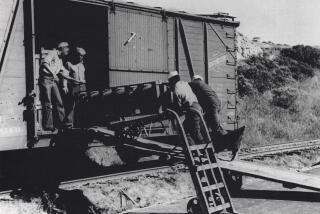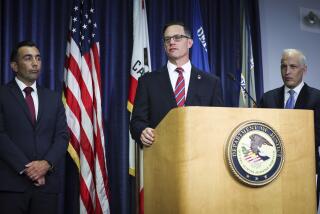Two Sailors Absolved of Ranger Plot : Gulf War: Pair had been accused of planning to take over aircraft carrier during Mideast conflict. Their attorney says they are peaceful Muslims.
- Share via
SAN DIEGO — The Navy on Thursday abruptly dropped all charges against two U.S. sailors accused of plotting to take over the San Diego-based aircraft carrier Ranger to aid Iraq during the Gulf war, officials said.
The decision vindicates the two sailors, Airman Apprentice Abdul Shaheed, 22, and Seaman Apprentice James L. Moss, 21, according to their lawyers.
“This was an overreaction from all sources,” said Lt. Victor Bernson Jr., Shaheed’s Navy-appointed attorney. “There was substantial evidence that both Shaheed and Moss were merely peaceful Muslims. They never supported Saddam Hussein in any way. There was also substantial evidence that the government’s key witnesses may have been less than credible.”
Shaheed said he believes the case against him was a result of religious discrimination and that he never, not even in jest, spoke of overthrowing the Ranger.
“Frankly, the case is like exaggeration of exaggeration,” Shaheed said in an interview. “Being Muslim, we only have fear of Allah. You have trust in God, He’s the judge. He knows who is righteous. Evidently, we were righteous because we prevailed.”
The move to drop the charges followed a three-week fact-finding visit aboard the huge carrier as it steamed home from the Gulf. Defense attorneys interviewed more than 50 crew members, who supported Shaheed and Moss and discredited the government’s witnesses.
“We had people by the dozens wanting to line up and talk to us,” said Lt. Brendan Ward, Moss’ attorney. “There was never any evidence. This whole story was concocted by one individual.”
Shaheed and Moss were ordered in April to stand trial next week for alleged offenses that occured Jan. 17 in the Persian Gulf, the night that the United States began bombing Iraq.
The two were initially charged with “urging disloyalty, mutiny or refusal of duty” and were accused of plotting to kidnap the carrier’s skipper, and sabotage the ship’s catapult launch and engineering systems. Navy officials, however, never made clear how the two would have accomplished that.
After the war, the charges were reduced to making disloyal statements, punishable by a maximum of 10 years in prison.
Shaheed and Moss countered that the key prosecution witness, Airman Apprentice Gregory Jones, had fabricated his tale of mutiny.
Jones, Ward said, “was a very cunning liar. He’s very deceptive, manipulative, untruthful person with great ability to exaggerate and imagine things.”
Ward said he believes the case may have snowballed because it coincided with the beginning of the U.S. air campaign in the Gulf. The Ranger’s commander, Capt. Ernest Christiansen, could not afford to allow possible saboteurs to freely roam about at such a crucial time--a fact that Jones probably counted on, the defense lawyer said.
Jones, too, had a motive--he wanted to get off the ship, the attorney said. Jones apparently believed that he would be removed for his own safety, after he told other crew members that the Muslim sect was threatening his life, Ward said.
It is not yet known what, if any, action might be taken against Jones.
“I am still debating whether to stay in the Navy or get out,” said Shaheed of Brooklyn, N.Y., who has served 3 1/2 years. “I am trying to organize my life and career to see a more positive future.”
A month before the incident, Moss, a 1 1/2-year veteran, filed for conscientious objector status--which he still hopes to obtain, Ward said.
Shaheed, who became a Muslim two years ago, said he believes the Navy created the unusual case against him and Moss because of their religion.
” . . . There really is not any representation of Muslims in the military--they really don’t have any understanding of it,” he said.
More to Read
Sign up for Essential California
The most important California stories and recommendations in your inbox every morning.
You may occasionally receive promotional content from the Los Angeles Times.










